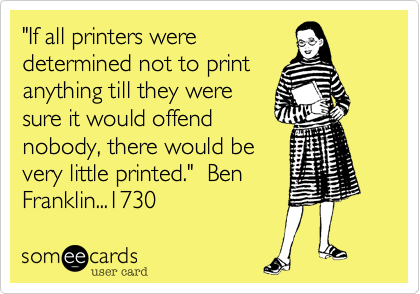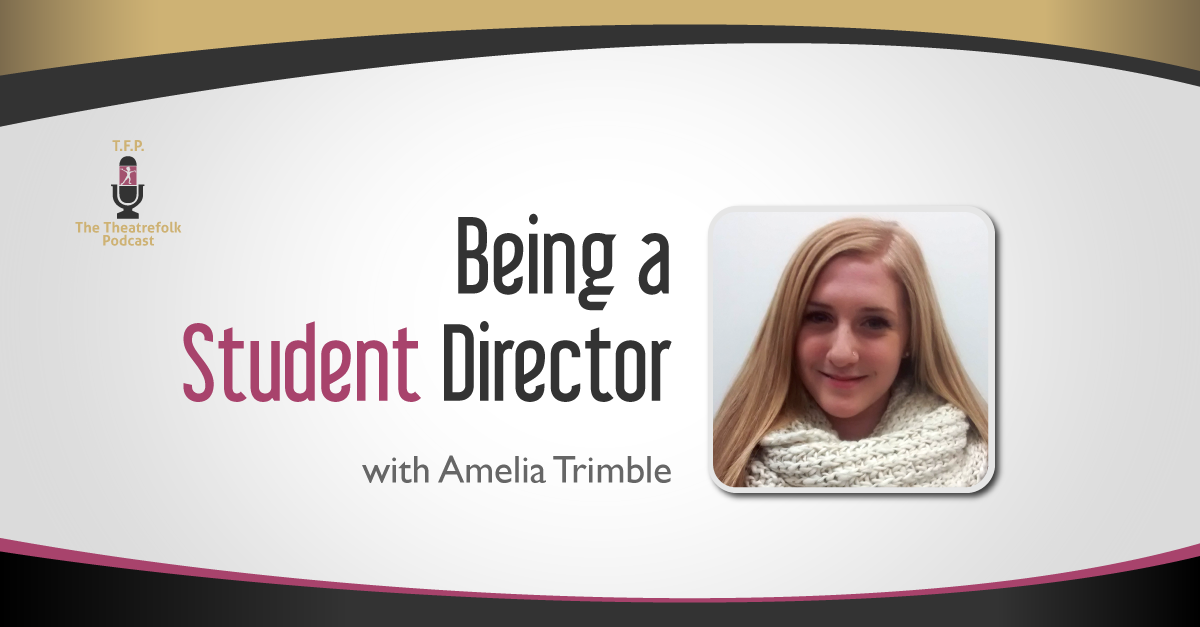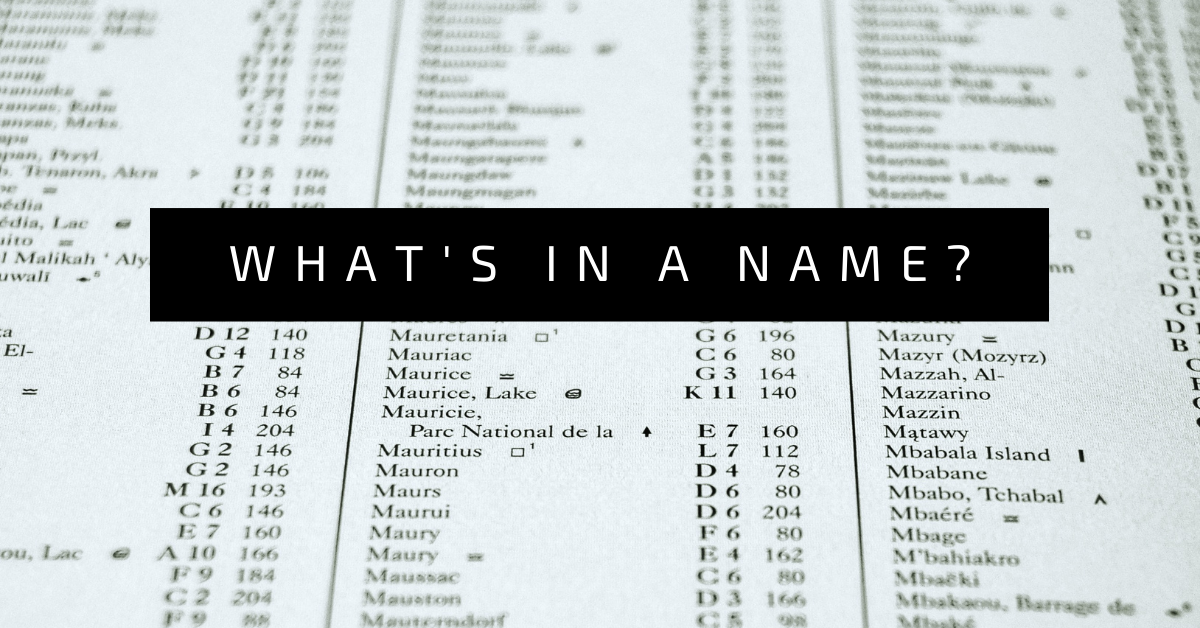The Weight You Give Them
Episode 31: The Weight You Give Them
Lindsay talks about the weight we’ve given to offensive words and why people are often more offended by words than actions.
Show Notes
Subscribe to The Theatrefolk Podcast
Episode Transcript
Welcome to TFP, The Theatrefolk Podcast. I am Lindsay Price, resident playwright for Theatrefolk. Hello! I hope you’re well. Thanks for listening.
Today, I’m going to pontificate on the being offensive, being offended, all round enraged by words. But first, some THEATREFOLK News.
Hey, hey, hey! It’s practical news today. It was very exciting! Craig came up to me while I was preparing this podcast and said, “I have some news for your news segment.” Oh, squee! And the news is all about our PDF downloads. Did you know that you can get all of our plays as a PDF download? Well, you can. You can order the physical book that comes in the mail, or you can use the internets to order and receive your copy as a PDF. Say you’re running behind – how dare you, Lindsay, to suggest that human beings run behind! – say that you are and you don’t have time, you’re doing a show and you don’t have time to get scripts in the mail. You can go to our website, bang! Choose a script, bang! Order the PDF, bang! Order the photocopy license, you are good to go. You’re golden.
But that is not the news. That is not what I’m here to talk about. It’s neither new nor news, unless you’ve never visited our website, or ordered anything from us. Theatrefolk, you know, the T in TFP. Hi. I hope you’re well. Thanks for listening. But the news is that our PDFs are now available to print in a tree-saving mode. You can now print them two up. I know that doesn’t sound like news, but it is! This is brand new, just got worked into our system. Save paper. Save a tree. Do it.
Lastly, where, oh, where can you find this podcast? We post new episodes every Wednesday at theatrefolk.com and on our Facebook page and Twitter. You can find us on the Stitcher app AND you can subscribe to TFP on iTunes. All you have to do is search on the word “Theatrefolk.”
Episode Thirty-One: The Weight You Give Them
And what are we talking about giving weight? Words, words, words.
In general, in my practice of playwriting – that is the playwriting I do for schools and student performers – the tightrope of dealing with offensive language is wire-thin and a mile high. And when you walk it, there’s no net and a gale force wind. How’s that for an image? Good luck getting across! I’ll be eating a cheese sandwich in a bomb shelter somewhere.
And that’s the thing. Some artists think, particularly those of us who present their work to the public in some fashion, we think we can avoid that tightrope, we can avoid offending people. I know, you know, some artists are all about being offensive. “Roar! I want to offend people and make them walk out and fling feces and blood and make them sit up and take notice! I will run across that wire-thin mile-high tightrope with seething confidence! Roar!” Yes, that’s my offensive artist voice. Okay.
But, for the non-offending types, it all comes down to, a lot of times, wanting everyone to like us – our work and us. Me, you know? It all stems from wanting universal love. I admit it. And then I start to think, “Well, if I don’t offend anybody then everyone will automatically love me. That’ll work! That’s exactly what I have to do!”
Uhuh, except that that doesn’t work – it’s a slippery slope because there is no one list of words that are offensive to everybody. And, sometimes, it’s not the words. It’s the concept behind the words. And what offends person A will be totally laughed off by person B. So, let’s get into all that fun stuff.
Because I write for schools and student performers, one of the general rules when it comes to offensive language is that I can’t often swear in the dialogue. Yes, I have, and yes, there are many, many schools that are open to that kind of language – they want gritty and real – although I don’t really want to get into this kind of fake notion that swearing equals real, you know? But, you know, they’re okay with the swears, love the swears, need the swears. It’s all good.
However, generally, there is a, you know, an unwritten, unspoken rule that, in the school market, swearing is offensive, period. And swearing will make teenagers do horrible, unlawful things, period. So, it’s not done.
And if I have a character who swears, nine times out of ten, I will be asked if the language can be removed. To the point that, I’ve got a couple of plays where there is swearing – I have one called POWER PLAY which is about violence and the violence of language is something that can’t nor will I ignore – so I have this huge notice at the front of the play that says, “If you can’t do the play as is, if your school is very much a No Swearing, Period school then don’t do the play. Pick another play.” And there are just many, many schools that will not allow swearing on stage. You know, students can’t handle it which that very well may be, but there’s also that whole sneaky, unspoken idea that swearing is only done by bad people.
You know, never mind that it’s happening all around. Never mind that swearing doesn’t actually make you a bad person. Let’s say for argument’s sake that nice people don’t swear – which you can’t because that’s not true! I know some very good, gentle humanitarians who have uttered a curse word or two, you know. So, okay, that’s what the rule is if, you know, we’re raising a generation of nice people, swearing is one of the things – right off the bat – that’s a no-no and so, I’ve got to address that. And, in general, I’m pretty okay with it. It doesn’t bother me.
Sometimes, I find swearing is an easy go-to, right? I want this character to be shocking so I’ll use shocking words. And it’s more about the word than why the character uses the word. When a character is using a word to a purpose, to show a personality, and even more so, I find it really, oh, I find swearing rather delicious when a playwright finds a way to explore the rhythm of the words and to play with sound of the words and how it just sort of flows out of a character. There’s a character in Lanford Wilson’s Burn This who, I think, is 99 percent swear words and the language embodies this character to the hilt, and that’s different. That’s different – to embody a character is different than “Oh, this character’s going to say a swear word and that’ll be shocking, yeah! Oh, yeah! Good stuff!”
Anyway, for me, I like a challenge. I like being told, “You can’t do that.” Boundaries are interesting to write through, and over, and under, and it’s just fine for me. So, you’ve got to find a way to do it. I have a real hate/love relationship with the notion of coming up with replacements for swear words. You can’t say “oh fudge!” and expect a 21st century teen audience to accept it or go with it. It sounds fake. It is fake! It’s the playwright trying to make somebody – an outside entity – happy rather than facing the challenge of finding another solution. And it works both ways, you know, when you swear to shock rather be character-driven – it sounds fake. And when you try to put in PG words to mimic swearing, it also sounds fake. It’s all fake.
Writing swears in the fantasy world – be it sci-fi or a fairy-land – I find that that’s the most fun because there are no rules for what constitutes a swear word. It could be something as harmless as “mushroom caps!” See? It’s all about rhythm and how things fit in the world of the play.
I think the TV show Battlestar Gallatcica got such mileage out using the word “Frack.” You know? The point of the swear word is that it is an explosive emotion and it’s satisfying to say. And oh, they use that word so explosively and oh, imagine, it was tremendously satisfying to say. The way they flung that word around, they set it up in the world, it made sense in the world. There was no mistaking what they were trying to say but it was a nonsense word and they gave a nonsense word power and the were able to create a language that characters would use in the real life of those characters and they gave it such power and such vehemence at times without that quote-unquote offence.
But, you know, it’s not just swear words that come under the label “offensive” and this is where I really start to get bothered. I get it; I get the “No swearing. We can’t have swearing in the school. We’re making nice folks and nice folks don’t swear.” Fine. Students can’t handle it, fine. I’ll go with that 100 percent. Well, I have to. It’s, you know, I can make a stand and have all these swears in my plays but then no one’s going to do them, you know? It’s ridiculous. So, I’m absolutely going to stand by what others create about their world, right?
But, when we start getting into the world of words that are not swears but words that are concepts that people don’t like, and it really bothers me when we get a call to change a word that has no connection at all to being a dirty word but someone has decided that somebody might get offended and that it might cause a problem and that it would be better to white wash the world their students live in.
We had a school ask us if they could remove all uses of the word “Christmas” in our adaptation of A Christmas Carol. Yes, I am not kidding. I have another play where an adult character is quitting smoking and is having a rough time of it so they talk about it. But, the point of it is that they are quitting. Not quitting, they have quit! They are not doing it and that they don’t give up. They don’t go back to smoking. They’re just talking about it. And more than one school has asked us to remove the word “smoking” from the play. You know, “Can he be giving out caffeine?” And it doesn’t seem to matter that the character is actually doing something good. He’s doing something hard. He’s quitting smoking and he’s not giving up. Isn’t that important to show students? Isn’t that a good thing? “No, it is not a good thing.” You can’t even say the word because, I suppose, if students hear “smoking,” they’ll all be searching for their cigs. I don’t know! The character’s quitting. It’s beyond me!
And another word which, I know, I am totally on the wrong side of this argument and I – no, I don’t accept it but I know I’m on the wrong side of this argument so there’s nothing that I can say that’s going to win this argument for me but… So, okay, now we’re going to have a little confab on the word “retarded.” Yes, I know, I know. It is offensive. It is very offensive for some. And enough people have made their point known, people whose opinions I, you know, value that I don’t use it anymore in my character vocabulary. There’s no need to get twisted over it, I don’t use it anymore. It’s out. It’s stricken for good.
Now, here’s my problem with removing it from my character vocabulary. Bad characters say bad words. That’s one of the ways that you know that they’re bad. But I can’t have a character swear, right? There’s that rule. No swears. Okay! If that’s your rule, I’m going to go with it. So, I have to think of some other means, some other words to use to show they are bad. You know, like “retarded” – they are saying words that they shouldn’t. It’s clear the character is bad, is using the word badly, “Hey! That’s how we know the character is bad.” It’s impossible to have a bad character who does nothing bad. That is not dramatic. Oh, and when people just get so wound so tightly over seeing bad characters on stage, first of all, it’s not real, and second of all, you know, there is no world where bad people don’t exist. You can’t have plays that are wallpaper – although, I do believe that some schools would like for their students to sit and look at wallpaper. That would be a good play for them because then nobody gets offended and I’m so fascinated at the idea that words are as offensive as acts.
I find it offensive that people are so afraid of words and what words might do that the only solution is to purge them, and that’s a wonderful notion except it’s impossible. The words are all around. They exist. They happen. They are vocalized every day, and worse. And, really, the whole point of our human existence is that we should deal with the bad things that come our way, not remove them, you know? We are all different – we speak differently, we express our views differently. Sometimes, nice people swear. We express our emotions and our passions differently.
A bad person does not a bad person make. And again, I know – oh, all the things that I know, oh, my goodness! My goodness gracious. Anyway, I know, I am an outsider in this whole scenario. I am not a principal. I am not a teacher. I drop into schools. I do my song and dance and I leave. I’m not there all day, five days a week. And I would hope that those who are in the school know their students better than I, know that there are particular students – “Hey, you know what? Last time we had a play with a swear word, there was a riot.” Okay, fair enough. But I do see so many students from all over the place – and my plays are done, you know, across Canada, across the US, all over the world – and I’ve never been told of a situation where the use of a word in a play has led to something bad. Has somebody encountered this? You know, am I totally off my rocker? Am I totally wrong? You know, am I? I don’t know.
So, I’m going to end with a couple of things. If you want to read what I really think about this topic, because I’ve been so vague up to now, I wrote a whole play about it called Censorbleep and there is a character called The Poet who talks about the offensive nature of words and when he says “not here,” he’s talking about school.
“This is the word ‘gun’ on the page, made of ink and paper. No metal. No bullets. I say the word gun, it’s not a gun. I point my finger, it’s not a gun. I got to the store and point my finger and say gun. What happens? In the real world, a gun is a gun. A finger is a finger. Not here. Who sees an imaginary gun and buys a real one? Who fears the word gun on the page? Bang.”
Oh, and I’ve also had – there’s another one – this is from the play, POWER PLAY, that I’ve had teachers call and they had to cancel the production because an administration saw the word “gun” in the description. Didn’t read the play; just saw the word “gun.”
And then, I did a little googling on quotes about offensive and I particularly like these three. So, the first from George Bernard Shaw: “The secret to success is to effend, affend” – why are we affending? Let’s try that again! “The secret to success is to offend the greatest number of people.” That is really hard to do, you know? The pull to be liked, I think, is so much stronger than the pull to say something unique.
This one by Benjamin Franklin, “If all printers were determined not to print anything till they were sure it would offend nobody, there would be very little printed.” Amen to that!
And lastly, from Leonardo da Vinci, “I have offended God and mankind because my work didn’t reach the quality it should have.” And that one is really what it’s all about. If the quality of the work suffers because you’re sitting in a bomb shelter, eating a cheese sandwich instead of trying to manoeuvre that tightrope, maybe that is what is really offensive deep down. If I’m putting safe ahead of what I want to express, ahead of what I think the height my art could reach, and that I have offended, it’s tricky! It’s easy to want everyone to like what you do like a hot cup of cocoa and a fuzzy blanket. And you know what? There’s nothing wrong with a fuzzy blanket. I have written my fair share of fuzzy blanket plays. I like them! I’ve got no bones about it at all. But there’s got to be more. Every once in a while, there has to be more – there has to be some time spent on that wire, facing the wind, knowing there’s no net, and accepting whatever comes my way.
And that’s where we’re going to end. Take care, my friends. Take care.
Music credit: “Ave” by Alex (feat. Morusque) is licensed under a Creative Commons license.



